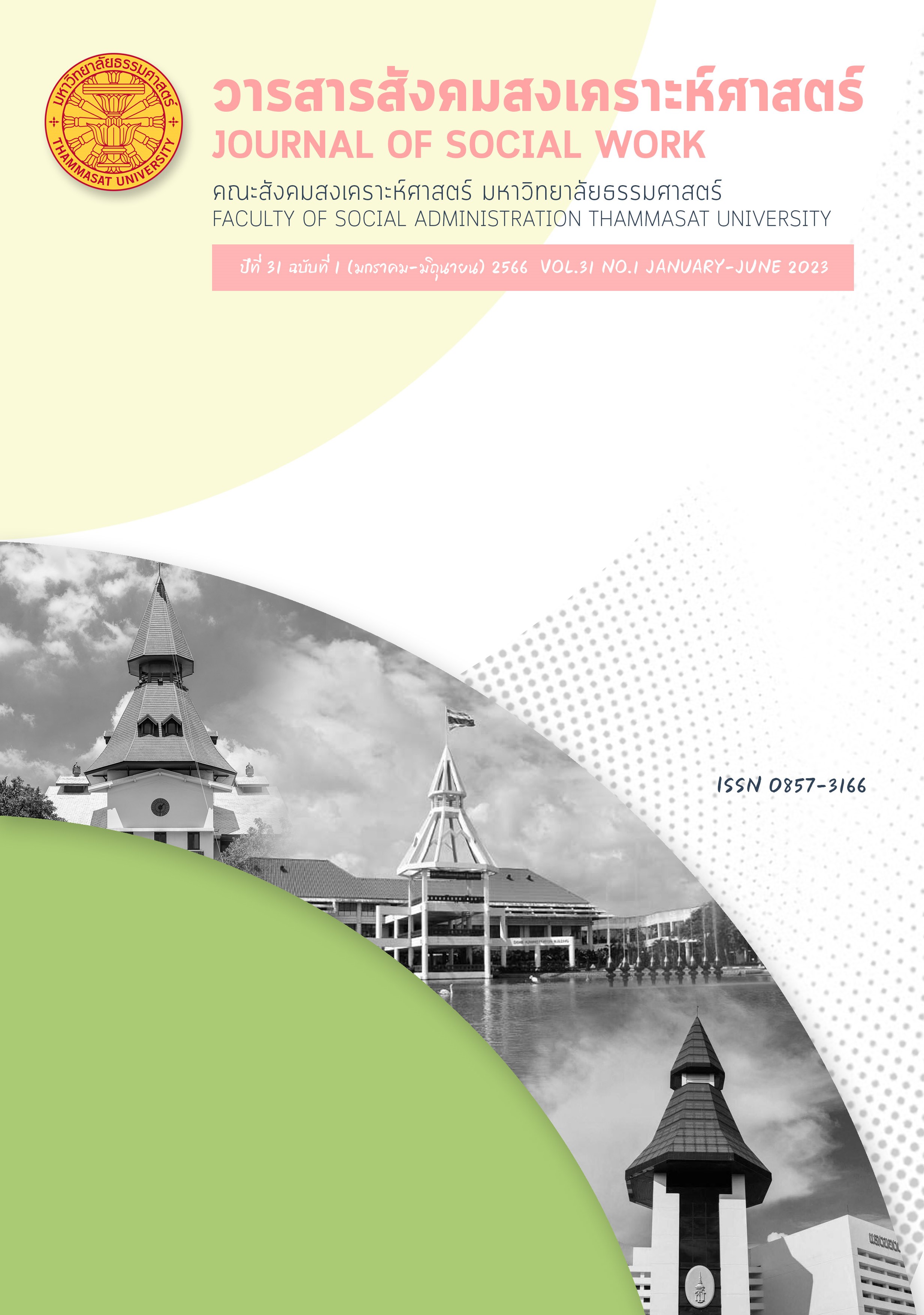Imbalance Mental Health Care System and Social Exclusion
Keywords:
Imbalanced mental health care system, Deinstitutionalization, Social exclusionAbstract
This academic article aims to demonstrate the social exclusion that occurs in imbalanced mental health care system. Since 1970, global mental health policies have given precedence to community services, which need to be altered in terms of structures of decentralization and their philosophical foundation. In Thailand, even the large psychiatric hospitals have not been reduced in quantity and size, but mental health work in the community and primary health care integration with mental health services have increased, which make Thailand’s mental health care system activated. This article suggests that even though mental health services in communities have improved, the overall mental health care system in Thailand is still based on hospitals, based on old-fashioned ideas and mindsets towards the imbalanced mental health care system. This system, driven by modern psychiatry concepts, allows communities to become a part of psychiatric institutions, but has not aligned itself with the mindsets which exist within these communities. It has created disparities in treatment and employment; and also brought about social exclusion, a fundamental problem facing people who experience psychiatric disorders living in a social context in which bio-medicine is authoritative.
References
กรมสุขภาพจิต. (2550). รายงานประจำปีกรมสุขภาพจิตปีงบประมาณ2550. กรุงเทพฯ: เทพเพ็ญวานิลย์
กรมสุขภาพจิต. (2553). รายงานประจำปีกรมสุขภาพจิตปีงบประมาณ2553, 1 สิงหาคม 2565. https://dmh.go.th/download/dmhnews/report2552.pdf
กรมสุขภาพจิต. (2553). รายงานประจำปีกรมสุขภาพจิตปีงบประมาณ2553, 1 สิงหาคม 2565. https://dmh.go.th/download/Ebooks/rpt53.pdf
กรมสุขภาพจิต. (2557). รายงานประจำปีกรมสุขภาพจิตปีงบประมาณ2557. กรุงเทพฯ: บียอนด์ พับลัสซิ่งจำกัด.
กรมสุขภาพจิต. (2558). รายงานประจำปีกรมสุขภาพจิตปีงบประมาณ2558. กรุงเทพฯ: หจก.งานพิมพ์.
กรมสุขภาพจิต. (2560). รายงานประจำปีกรมสุขภาพจิตปีงบประมาณ2560. กรุงเทพฯ: ละม่อมจำกัด.
กรมสุขภาพจิต. (2563). รายงานประจำปีกรมสุขภาพจิต ปีงบประมาณ2563. กรุงเทพฯ: บริษัทละม่อมจำกัด.
ชัยพร อุโฆษจันทร์. (2558). กระบวนการทำงานของมลทินประทับของผู้ป่วยจิตเวชหลังจำหน่าย ผู้ดูแล และบุคคลแวดล้อมในชุมชนจังหวัดเชียงใหม่, วิทยานิพนธ์ปริญญามหาบัณฑิต. กรุงเทพ: มหาวิทยาลัยธรรมศาสตร์.
ชัยพร อุโฆษจันทร์ .(2562). การฟื้นคืนสภาพ การสลับขั้วของอำนาจในแนวคิดด้านสุขภาพจิต. วารสารมหาวิทยาลัยศิลปากร, 39(2), 128-139.
นฤพล ด้วงวิเศษ. (2564). ภววิทยา. สืบค้นเมื่อ 25 กันยายน 2565, จาก https://www.sac.or.th/portal/th/article/detail/219.
พระราชบัญญัติสุขภาพจิต (ฉบับที่2) พ.ศ. 2562. (16 เมษายน 2562). ราชกิจจานุเบกษา. เล่ม 136 ตอน 50ก. หน้า 210-218.
สิทธิโชค ชาวไร่เงิน. (2556). ชีวิตในบ้าน “กึ่งวิถีชาย” นิยามสถาบันกับชีวิตใต้ตารางของสมาชิก (วิทยานิพนธ์ปริญญามหาบัณฑิต). กรุงเทพ: มหาวิทยาลัยธรรมศาสตร์.
สมเกียรติ ตั้งมโน. (2552) .แนวความคิดหลังสมัยใหม่. ตำราประกอบการบรรยายวิชาปรัชญาศิลป์และศิลปะวิจารณ์ คณะวิจิตรศิลป์ มหาวิทยาลัยเชียงใหม่.
อานันท์ กาญจนพันธุ์. (2562). คิดอย่างมิเชล ฟูโกต์ คิดอย่างวิพากษ์ (พิมพ์ครั้งที่ 3, ปรับปรุงใหม่). กรุงเทพฯ: สยามปริทัศน์.
Baeza, F. L., da Rocha, N.S., & Fleck, M.P. (2018). Predictors of length of stay in acute psychiatric inpatient facility in a general hospital: a prospective study. Brazilian Journal of Psychiatry, 40(1), 89-96. doi:10.1590/1516-4446-2016-2155.
Bracken, T., & Thomas, P. (2001). Post psychiatry: A new direction for mental health. BMJ Clinical Research, 322(7288), 724-727. Doi 10.1136/bmj.322.7288.724.
Busfield, J. (1989). SEXISM AND PSYCHIATRY. Sociology, 23(3), 343–364. http://www.jstor.org/stable/42853861
Goffman, E. (1963). Stigma Notes on the Management of Spoiled Identity. New-Jersey: Prentice-Hall. Inc.
Kotowicz, Z. (1997). R.D. Laing and the Paths of Anti-Psychiatry. London: Routledge.
Lee, S., Rothbard, A.B., & Noll, E.L. (2012). Length of Inpatient Stay of Persons with Serious Mental Illness: Effects of Hospital and Regional Characteristics. Psychiatric Serf vices, 63(9), 889-895.
McDaid, D., & Thornicroft, G. (2005). Policy Brief: mental health II balancing institutional and community -based care. Retrieved January 10, 2022, from https://www.researchgate.net/publication/
_Mental_health_II_Balancing_institutional_and_community-based_care.
Parry, M. (2010). From a patient's perspective: Clifford Whittingham Beers' work to reform mental health services. American journal of public health, 100(12), 2356–2357. Doi: 10.2105/AJPH.2010.191411.
Pellegrino, E. D. (1999) The Commodification of Medical and Health Care: The Moral Consequences of a Paradigm Shift from a Professional to a Market Ethic, Journal of Medicine and Philosophy, 24(3), 243-266, DOI: 10.1076/jmep.24.3.243.2523
Sealy, P., & Whitehead. P. C. (2004). Forty years of deinstitutionalization of psychiatric services in Canada: an empirical assessment. Can J Psychiatry, 49(4), 249-257. Doi 10.1177/070674370404900405
Serapioni, M. (2019). Franco Basaglia: biography of a revolution. Historia, Ciencias, Saude-Manuinhos, 26(4), 1-18. Doi: 10.1590/S0104-59702019000400008
Thornicroft, G., & Tansella, M. (2013). The balanced care model for global mental health. Psychological medicine, 43(4), 849–863. Doi: 10.1017/S0033291712001420.
Watson, D. P. (2013). Evolving understanding of recovery: what the sociology of mental health has to offer. Humanity Soc, 36(4), 290–308. doi:10.1177/0160597612458904
Watson, G. (2019). 114 psychiatric beds per100,000 people in 2017-eurostat. Retrieved November 30, 2022, from Newsbook Website https://newsbook.com.mt/en/114-psychiatric-beds-per-100000-people-in-2017-eurostat/
WHO. (2018). Psychiatrists Working in Mental Health Sector (Per100,000). Retrieved January 5, 2022, from https://www.who.int/data/gho/data/indicators/indicator-details/GHO/psychiatrists-working-in-mental-health-sector-(per-100-000)
Downloads
Published
How to Cite
Issue
Section
License
Copyright (c) 2023 Journal of Social Work

This work is licensed under a Creative Commons Attribution-NonCommercial-NoDerivatives 4.0 International License.
The manuscripts published in the Social Work Journal is the copyright of the Social Work Journal, Thammasat University
Any article or opinion appeared in the Social Work Journal will solely be under the responsibility of the author The Faculty of Social Administration, Thammasat University and the editors do not need to reach in agreement or hold any responsibility.



